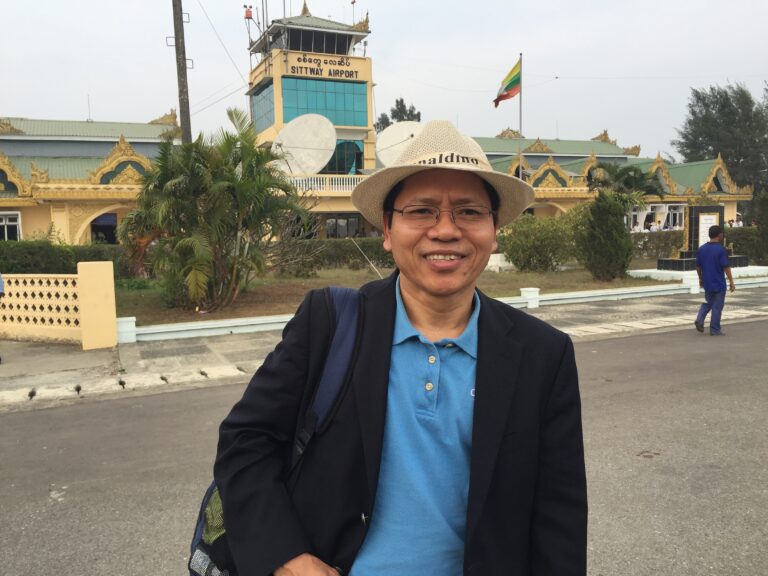I grew up in Tamu town, an Indo-Burma border town in Sagaing Region or province located in the northwest part of Burma (Myanmar).
My parents practiced spirit worship, but they converted to Christianity when I was a young child. Because we lived in a predominately Buddhist area, I attended a Buddhist school.
When I was 18, I responded to a missionary’s altar call and became a Christian. I had a burden to share with my Buddhist friends the gospel of Jesus Christ. So, I decided to attend Bible college. I then continued my theological studies in India, the Philippines and the United States.
In 1993, I was impacted personally by violence inflicted on the community in which I was raised due to religious beliefs. I was doing studies at a seminary in the Philippines when back home, my pastor and three village leaders were killed and our church elders were tortured. They were accused of insulting some group of citizens.
The conflict in Myanmar is not solely about religious persecution, but is a battle between democracy and dictatorship, with the public supporting the democratic movement.
Myanmar has struggled with military rule, civil war, poor governance and poverty during its decades of independence. Min Aung Hlaing, chief of the military government, took control of the country in a coup in 2021, squashing hopes for democratic reforms in the Southeast Asian nation.
The reality is, however, there is religious persecution in Myanmar.
Religious persecution in Myanmar
Religious persecution in Myanmar is not just about ideology, but is also about destroying religious symbols and institutions to enforce total allegiance to the government. When soldiers went to our villages and Christian areas, they destroyed churches, arrested pastors, threw Bibles outside and even spent the night in the church.
Christians live in fear in Myanmar. For example, it could be midnight and dogs are barking. There is always fear the police or military soldiers are coming.
Sign up for our weekly edition and get all our headlines in your inbox on Thursdays
When I returned to Myanmar after schooling and began pastoring a church, I always was shadowed by the Ministry of Intelligence. Whenever I preached, they would listen and then report to their office what I was saying. On occasion, they would request to see my sermon notes in advance.
All churches are open to the public in Myanmar, but they must be registered. At times, the government required us to submit our notes so they could check the content.
During that time, I also was serving as general secretary of a Baptist association. One night while I was at their office training some pastors, the police came and wanted to see my notes. They did not find anything that was against the government, so they left.
However, the next morning, I was called to the administrative office of the court. They wanted to know why I was training pastors without their permission. I had submitted my application for permission the prior month, but I heard nothing. So, I went forward with the training. They checked their records, and then I was allowed to leave.
Ministry under duress
I came to the United States in 1996 to study chaplaincy ministry so I could return to my country and start one in a hospital. After I finished my studies, I returned to Myanmar for two years to serve as a minister and complete my term as general secretary of the Baptist association.
While in the United States, my wife had health issues that precluded her from going back to Myanmar with me for those two years.

I have returned to Myanmar multiple times since for ministry and mission trips, but after the coup in 2020, the situation for Christians has deteriorated significantly. There is no justice or rule of law.
I still have family in Burma, and my sisters are living as refugees in India. Refugees from Myanmar face unequal treatment in India, with some states providing aid, while others reject them.
The Myanmar Baptist Convention is the largest Baptist organization in Asia, with 1.5 million members and more than 5,000 churches.
In the western part of Myanmar, we have lost more than 200 local churches. As for the rest of the country, at least 500 local churches are not functioning due to fear and violence forcing Christians in villages and towns to flee. In the cities, some churches are functioning but with limitations.
Christians and other religious minorities in Myanmar are suffering and in danger. They cannot speak out due to fear of arrest, torture or death. We must not tire of amplifying their voice, telling their stories and advocating for them to live out their faith in their country without fear.
Only those outside the country can speak boldly about the reality of the situation in Myanmar.
Pray for Myanmar
Pray that God will change the hearts of military leaders in Myanmar. Change of heart is important, so they will have the courage to take responsibility for their actions. Without this, the problems will continue.
Pray for the Christians in Myanmar to have endurance and to find a secure, safe place to live.
Pray for the young, pro-democracy fighters fighting for justice and peace.
*******
You can learn more about the current situation in Burma (Myanmar) and the religious freedoms under attack here and here.
Rev. Dr. Thong Kho Lun is the founding pastor of Greater Houston Burmese Christian Fellowship, a mission of Tallowood Baptist Church in Houston. His wife Rev. Dr. Mang Tiak is associate pastor. He is the president of the Burmese Christian Association of North America and continues to be involved in mission work in Myanmar and Thailand.
This article first appeared on 21Wilberforce.org and is adapted and republished by permission.















We seek to connect God’s story and God’s people around the world. To learn more about God’s story, click here.
Send comments and feedback to Eric Black, our editor. For comments to be published, please specify “letter to the editor.” Maximum length for publication is 300 words.